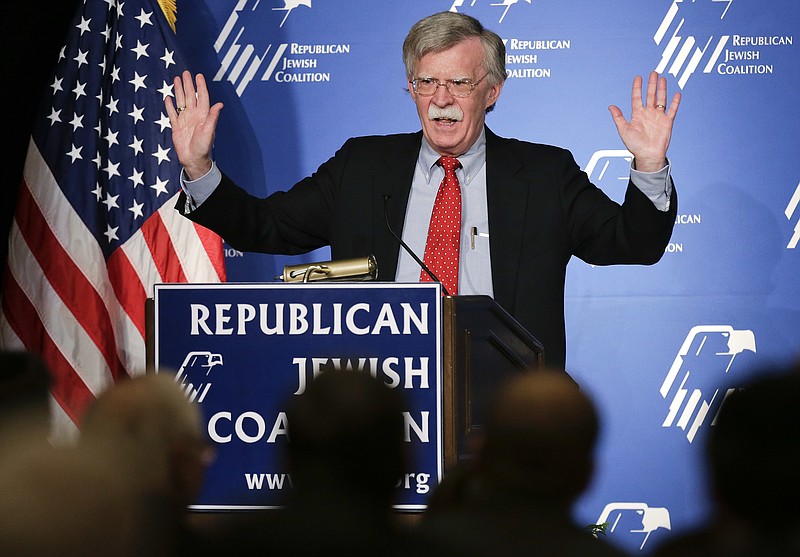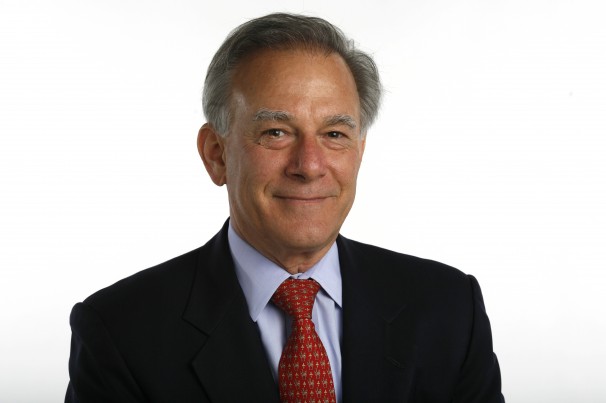WASHINGTON - John Bolton is a bit like the barking dog that finally catches the car: What does he do now?
Bolton surely has never once imagined himself as an "honest broker," the quality that usually defines a successful national security adviser, the post he's about to assume. Instead, Bolton has cultivated the image of a provocateur, bureaucratic infighter and permanent enfant terrible. He has seen his role as challenging policy, rather than sustaining it.
Bolton will take control of a foreign-policy process that needs something more than the incendiary rhetoric of a Fox News commentator.
The fiery Bolton is a worrying match for his new boss, who displays many of the same combative qualities. A belligerent, bellicose president now has a person with similar traits as his chief White House foreign-policy adviser. That scares people, at home and abroad.
Bolton's former colleagues describe a more complicated person than some news accounts have suggested. During the Bush 41 administration, Bolton was a pupil of Secretary of State James Baker, perhaps the master bureaucratic player of modern American politics. Bolton's contemporaries describe a "results-oriented" Yale Law graduate who shaped the U.N. resolutions that took America into the Gulf War and then framed a ceasefire. Colleagues in later years remember a more inflexible and manipulative Bolton.
"I learned a lot of bureaucratic skills in the Baker years that I was later able to use many times to confound the bureaucracy," Bolton writes in his 2007 memoir. He describes Baker's key precept: "Yield on process issues in order to hold the line on substantive questions."
Bolton's test as national security adviser is that he'll now be the person responsible for overseeing a process he instinctively mistrusts. It will be an awkward fit for someone who (much like Donald Trump) sees his mission as a disrupter of conventional wisdom. Bolton must realize that the interagency structure isn't working well. But can he fix it under a president who seems to like the chaos?
Bolton relishes his confrontational reputation. By his own account, he doesn't worry about being seen as a "nice person." In his 2007 memoir, he refers to advocates of traditional foreign-policy views as "High Minded accommodationists," "EUroids," and the "Risen Bureaucracy." Interestingly, the only national security adviser in memory who had a comparable suspicion of the bureaucracy was Henry Kissinger.
Arguably, Bolton has been preparing through his career for the three major challenges he will face as national security adviser: arms-control confrontations with North Korea, Iran and Russia.
Bolton's hawkishness toward North Korea now looks prescient. He argued that Pyongyang would betray its nuclear-disarmament promises under the 1994 Agreed Framework and the 2003-2009 Six Party Talks. He also wrote that it was a mistake to "let North Korea escape" from sanctions without verifiable steps to de-nuclearization. He will face precisely this issue as President Trump begins face-to-face negotiations with Kim Jong Un.
Maybe Bolton's appointment sends Pyongyang a message that Trump isn't bluffing. That enhances leverage, but it also increases the risk of conflict.
On Iran, with Trump already close to abandoning the nuclear agreement, Bolton's appointment looks eerily like the last nail in that coffin. But Bolton should ponder one last time whether U.S. and Israeli security truly will be enhanced by the agreement's collapse. Four former Israeli military leaders argued no in a statement last weekend.
Bolton's biggest stretch may be managing the accommodation that Trump apparently wants with Russia. Trump proposes arms-control talks with Moscow; Bolton will bring to that effort a deep and perhaps useful skepticism.
The final test for Bolton will be to maintain America's strong alliances in Europe and Asia. Stroking allies is not his metier, to put it mildly. In his memoir, Bolton attacks diplomats' predilection for "accommodation and compromise with foreigners."
With Bolton, the war cabinet is complete. Trump will now be constrained only if he believes deep down that you can't make America great again and also go to war.
Washington Post Writers Group

